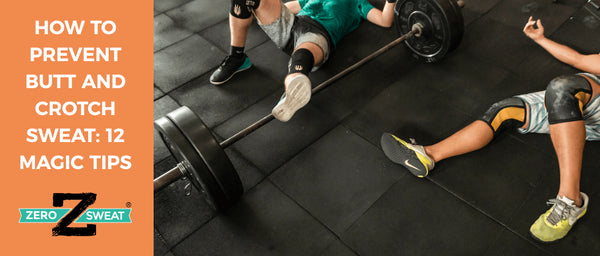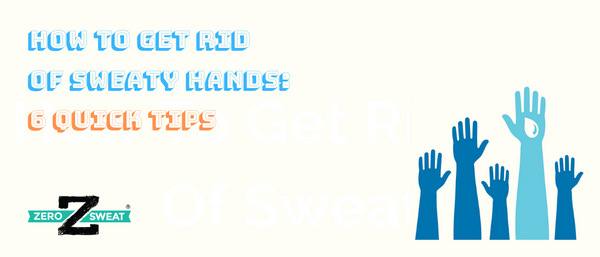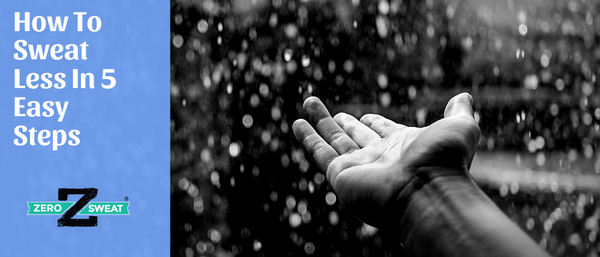5 Symptoms & 6 Causes of Hyperhidrosis

We all sweat when we’re working out or when we get hot. It’s the body’s natural reaction to try and cool us down. But, for those with hyperhidrosis, they may literally be dripping with sweat. Hyperhidrosis is a condition characterized by excessive sweating. This excessive sweating can occur over the whole body or just one specific area. It most commonly affects the feet, hands, face, and underarms. It is not a life-threatening or physically painful condition, but it can cause embarrassment, anxiety, and even psychological trauma to those suffering from it.
According to the International Hyperhidrosis Association, approximately 2.8 percent of Americans are affected by hyperhidrosis; that's around 7.8 million people! The biggest challenge is identifying the symptoms and recognizing if you have hyperhidrosis. We’ve compiled a list of symptoms to help you recognize if you may be suffering from hyperhidrosis.
1. Excessive sweat that soaks through clothing
If you are sweating through your clothing or even having to change your clothing due to excessive sweating, you may have hyperhidrosis. Sufferers of hyperhidrosis typically wear white or black clothing so that sweat marks are less visible. They may even wear jackets or sweaters, even in warmer environments, to cover up.

2. Clammy Hands and Feet
For some, hyperhidrosis affects only one area of the body such as the hands or feet. Those who have these symptoms constantly fear touching others as they may have clammy or even wet hands. When feet are affected it can lead to strong foot odors. Your feet may even slide around in your shoes.
3. Carrying around sweat battling gear
People with hyperhidrosis carry napkins, towels, pads, or antiperspirants to deal with the extra sweat throughout the day. Seeking out a way to absorb or prevent the excessive bouts of sweating is also a sign that you may have hyperhidrosis.
4. Avoidance of situations and activities where sweating is a problem
If you are adjusting your social life and activities around your sweat, then you may have hyperhidrosis. Many people with hyperhidrosis, feel embarrassed and anxious about their condition. In some situations that anxiety can even cause the sweating to increase. Activities such as dancing, formal functions, and sports, can make anybody sweat. For those with hyperhidrosis, these activities can lead to embarrassing sweat situations.
5. Making career adjustments
Excessive sweat can interfere with your work and even your career choices. If sweating is making your job difficult, you may have hyperhidrosis. Office workers with hyperhidrosis may experience sweat soaked keyboards and sweat-stained papers. They may have sweat filled presentations that get worse as the stress and the anxiety build. It’s a vicious sweat cycle.
Hyperhidrosis can also affect career choices. Careers, where manual dexterity is required, may have difficulty holding things because of the excess sweat. Laborers may have difficulty holding tools. Musicians can have difficulty playing their instruments. Athletes can have difficulty with holding and using sports equipment. Dancers and other performers may become embarrassed by their sweat because of their close contact with others.

Not only do those who have hyperhidrosis have these sometimes-embarrassing symptoms, but they are also prone to other physical symptoms. Nail infections, warts, bacterial infections, and heat rash are just some of the complications that can occur when the body is producing excessive sweat.
Hyperhidrosis that has no obvious cause, is called primary hyperhidrosis. Although it is not immediately clear what causes primary hyperhidrosis, it is thought to be related to parts of the nervous system that monitor our internal temperatures.
When the cause of hyperhidrosis can be identified, it is known as secondary hyperhidrosis. It can be triggered by changes in the body, hormones, illness, and other medical conditions. Some medications can also cause secondary hyperhidrosis. Here are some of the most common causes of secondary hyperhidrosis.
1. Pregnancy and menopause
Hormone levels can greatly affect how much we sweat. This occurs more often for women with changes in the body during pregnancy or menopause. Changes in hormones can cause excessive sweating to occur.

2. Low blood sugar
When a body’s blood glucose gets too low, it will trigger a fight or flight response. Once the body has this response it naturally reacts with excess adrenaline. One of the results of adrenaline is that the body then produces sweat.
3. Overactive thyroid gland (hyperthyroidism)
Hyperthyroidism occurs when the thyroid starts to overproduce hormones. This can lead to accelerated metabolism which speeds up many of your body’s processes, including the production of sweat.
4. Serious infections
Infections, such as Tuberculosis or HIV, can cause night sweats. Night sweats, otherwise known as nocturnal hyperhidrosis, are characterized by excessive sweating while asleep. It may require clothing and even bedding changes.
5. Parkinson’s Disease
Parkinson’s Disease can cause changes in sweat production. These change can vary person to person. Some patients experience a reduction of sweat production in some parts of the body while also experiencing an overproduction of sweat in other parts of the body.
6. Hodgkin’s and Non-Hodgkin’s lymphoma
One of the most notable symptoms and early signs of both lymphomas are excessive night sweats. Doctors are unsure of what causes the night sweats. One possible reason is the body’s natural reaction to rising temperatures. Another possible reason is the chemical produced in the body by the lymphoma cells.
Fortunately, there are many options in treating hyperhidrosis effectively. We know firsthand how difficult life can be when you have lots of sweat. That’s why we developed the ZeroSweat products, so that you can stay dry. Guaranteed. We want you to be able to live your life without having to worry about your sweat interfering with it.



